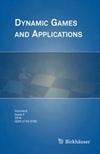Benefits of Rent Sharing in Dynamic Resource Games
IF 1.6
4区 数学
Q2 MATHEMATICS, INTERDISCIPLINARY APPLICATIONS
引用次数: 0
Abstract
Abstract Ngo Van Long’s classic paper on the risk of expropriation of natural resources published in a 1975 issue of the Journal of Economic Theory was an instant classic, which spawned a huge literature. Here I pay tribute to this wonderful brilliant yet modest scholar by briefly reviewing his contribution and then sketching how his insights can be used to analyse dynamic conflict over natural resources both as expropriation game and as a differential game on which Long has published extensively too. We discuss three results. First, if an incumbent faces a threat of a rival faction, extraction is more voracious if the factions do not share rents equally. Second, never-ending political conflict cycles are more inefficient if constitutional cohesiveness or rent sharing is strong and political instability is high. Third, resource wars are more intense if rent sharing is weak, reserves of resources are high, the wage is low, and elections occur less frequently.动态资源博弈中租金共享的效益
Ngo Van Long在1975年出版的《经济理论杂志》(Journal of Economic Theory)上发表的关于自然资源被征用风险的经典论文立即成为经典,并催生了大量文献。在此,我向这位杰出而谦逊的学者致敬,简要回顾他的贡献,然后概述如何将他的见解用于分析自然资源的动态冲突,既可以作为征用博弈,也可以作为差异博弈,朗也就此发表了大量文章。我们讨论三个结果。首先,如果在位者面临竞争派系的威胁,如果派系不能平等地分享租金,那么抽取就会更加贪婪。其次,如果宪法凝聚力或租金分摊较强,政治不稳定程度较高,那么永无止境的政治冲突周期效率会更高。第三,如果租金共享弱、资源储备高、工资低、选举发生频率低,资源战争就会更激烈。
本文章由计算机程序翻译,如有差异,请以英文原文为准。
求助全文
约1分钟内获得全文
求助全文
来源期刊

Dynamic Games and Applications
MATHEMATICS, INTERDISCIPLINARY APPLICATIONS-
CiteScore
3.20
自引率
13.30%
发文量
67
期刊介绍:
Dynamic Games and Applications is devoted to the development of all classes of dynamic games, namely, differential games, discrete-time dynamic games, evolutionary games, repeated and stochastic games, and their applications in all fields
 求助内容:
求助内容: 应助结果提醒方式:
应助结果提醒方式:


